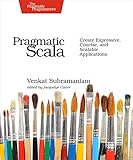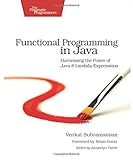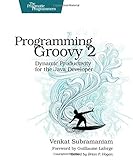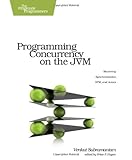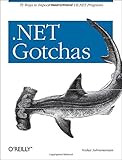Venkat Subramaniam
Founder @ Agile Developer, Inc.
Dr. Venkat Subramaniam is an award-winning author, founder of Agile Developer, Inc., creator of agilelearner.com, and an instructional professor at the University of Houston.He has trained and mentored thousands of software developers in the US, Canada, Europe, and Asia, and is a regularly-invited speaker at several international conferences. Venkat helps his clients effectively apply and succeed with sustainable agile practices on their software projects.
Venkat is a (co)author of multiple technical books, including the 2007 Jolt Productivity award winning book Practices of an Agile Developer. You can find a list of his books at agiledeveloper.com. You can reach him by email at venkats@agiledeveloper.com or on twitter at @venkat_s.
Presentations
Asynchronous Programming in Java: From Callbacks, to Completable Futures, to Virtual Threads
9:00 AM MDT
In the world of distributed computing that we live in today, asynchronous programming is taking a central stage from the architecture point of view, in order to provide better scalability. However, we are often cautioned about getting into asynchronous programming due to higher degree of complexity that is involved in writing asynchronous code and in managing exceptions. That cautioned is well founded, however, recent evolutions in Java is resetting the playing field, merging the simplicity of synchronous calls and the power of asynchronous execution.
In this workshop, we will take a deep dive into asynchronous programming in Java and learn about the three major options and which one we should really choose.
OOP vs. Data Oriented Programming: Which One to Choose?
8:30 AM MDT
We rely heavily on polymorphism when programming with the object-oriented paradigm. That has served us really well, especially to create extensible code. However, like any tool and technique, there are times when that may not be the right choice. Java now provides an alternative that is useful in those select situations—the data-oriented programming.
In this presentation we will start with an example where the highly useful object hierarchy and polymorphism appears as a misfit and discuss how data-oriented programming solves the problem more elegantly. Get a good understanding of when to use each one of these and how to intermix them in your applications.
Refactoring to Modernize Java Applications
10:30 AM MDT
IDEs have provided ways to refactor code for a long time now. In spite of their effectiveness, that journey is arduous and time consuming. Reluctance to refactor increases the cost of development. However, refactoring for the sake of doing so can lead to greater productivity loss as well.
In this presentation we will use data driven approach. We will take examples of code, measure code quality, and then use automated code transformation tools to refactor the code, and then, once again, measure the quality of code and see how much we have improved. This can help us to not only refactor faster but also see the benefits realized and motivate us to move faster with greater efficiency.
Structured Concurrency in Java
1:00 PM MDT
Dividing a large problem into subproblems that are scheduled to run on different threads is an often used solution. We've used executors and fork join pool for such problems in the past. These solutions, in spite of being very powerful, have significant limitations.
In this presentation we will start with those solutions, discuss the issues, and learn how structured concurrency, introduced in Java 21, can help solve such problems more effectively and elegantly.
Scaling Servers with Virtual Threads
3:00 PM MDT
Threads are lightweight, but do not scale well. That's one of the reasons we have been focused on the elastic capabilities on the cloud. Unfortunately that has an impact both on our environment and your companies wallet.
In this presentation we will learn how virtual threads reduce those impacts and help us to create scalable applications with minimum change to code.
Identifying and fixing Issues in Code using AI based tools
5:00 PM MDT
Software vulnerability is a huge concern. What's lurking in code is a question that keeps passionate programmers up at night. Is there a memory leak, what about a race condition, oh what about security issues, are we violating purity of functions when we're not supposed to? We have to maintain code that others have written and it's not always easy and quick to detect those defects ticking away in the code.
In this presentation we will use AI based tools to detect issues in code, using multiple examples, and apply automated fixes and will reason about our approach and the change.
The Three Amigos: Intermixing Pattern Matching, Records, and Sealed Classes
9:00 AM MDT
One of the coolest aspect of Java is the fact that the newer features simply do not live in isolation, but interplay quite nicely with each other. A place where this is clearly evident is the synergy between records, sealed classes, and pattern matching.
In this presentation we will focus on pattern matching and how its power is enhanced by records and also the sealed classes. The details presented will help you to make the best use of all the three features in your own applications.
Design Patterns Revisited in Modern Java
11:00 AM MDT
Design patterns have been around for a long time and we use them extensively in Java. Yet, as the languages evolve so do the user of patterns.
In this presentation we will learn some anti-patters and patterns and make use of some modern features to create more elegant and maintainable code.
Exception Handing and Functional Programming: Choose Wisely
1:30 PM MDT
Functional programming is know for its benefits from ease to reason about the code to safe parallelization. However, exception handing is an area where things begin to fall apart.
In this presentation we will look at some prudent ways to tackle exceptions in functional style code.
Books
Test-Driving JavaScript Applications: Rapid, Confident, Maintainable Code
by Venkat Subramaniam
Debunk the myth that JavaScript is not easily testable. Whether you use Node.js, Express, MongoDB, jQuery, AngularJS, or directly manipulate the DOM, you can test-drive JavaScript. Learn the craft of writing meaningful, deterministic automated tests with Karma, Mocha, and Chai. Test asynchronous JavaScript, decouple and properly mock out dependencies, measure code coverage, and create lightweight modular designs of both server-side and client-side code. Your investment in writing tests will pay high dividends as you create code that's predictable and cost-effective to change.
Design and code JavaScript applications with automated tests. Writing meaningful tests is a skill that takes learning, some unlearning, and a lot of practice, and with this book, you'll hone that skill. Fire up the editor and get hands-on through practical exercises for effective automated testing and designing maintainable, modular code.
Start by learning when and why to do manual testing vs. automated verification. Focus tests on the important things, like the pre-conditions, the invariants, complex logic, and gnarly edge cases. Then begin to design asynchronous functions using automated tests. Carefully decouple and mock out intricate dependencies such as the DOM, geolocation API, file and database access, and Ajax calls to remote servers.
Step by step, test code that uses Node.js, Express, MongoDB, jQuery, and AngularJS. Know when and how to use tools such as Chai, Istanbul, Karma, Mocha, Protractor, and Sinon. Create tests with minimum effort and run them fast without having to spin up web servers or manually edit HTML pages to run in browsers. Then explore end-to-end testing to ensure all parts are wired and working well together.
Don't just imagine creating testable code, write it.
What You Need:
A computer with a text editor and your favorite browser. The book provides instructions to install the necessary automated testing-related tools.
Pragmatic Scala: Create Expressive, Concise, and Scalable Applications
by Venkat Subramaniam
Our industry is moving toward functional programming, but your object-oriented experience is still valuable. Scala combines the power of OO and functional programming, and Pragmatic Scala shows you how to work effectively with both. Updated to Scala 2.11, with in-depth coverage of new features such as Akka actors, parallel collections, and tail call optimization, this book will show you how to create stellar applications.
This thorough introduction to Scala will get you coding in this powerful language right away. You'll start from the familiar ground of Java and, with easy-to-follow examples, you'll learn how to create highly concise and expressive applications with Scala. You'll find out when and how to mix both imperative and functional style, and how to use parallel collections and Akka actors to create high-performance concurrent applications that effectively use multicore processors.
Scala has evolved since the first edition of this book, and Pragmatic Scala is a significant update. We've revised each chapter, and added three new chapters and six new sections to explore the new features in Scala. You'll learn how to:
Safely manage concurrency with parallel collections and Akka actors
Create expressive readable code with value classes and improved implicit conversions
Create strings from data with no sweat using string interpolation
Create domain-specific languages
* Optimize your recursions with tail call optimization
Whether you're interested in creating concise, robust single-threaded applications or highly expressive, thread-safe concurrent programs, this book has you covered.
What You Need:
The Scala compiler (2.x) and the JDK are required to make use of the concepts and the examples in this book.
Functional Programming in Java: Harnessing the Power Of Java 8 Lambda Expressions
by Venkat Subramaniam
Intermediate level, for programmers fairly familiar with Java, but new to the functional style of programming and lambda expressions.
Get ready to program in a whole new way. Functional Programming in Java will help you quickly get on top of the new, essential Java 8 language features and the functional style that will change and improve your code. This short, targeted book will help you make the paradigm shift from the old imperative way to a less error-prone, more elegant, and concise coding style that's also a breeze to parallelize. You'll explore the syntax and semantics of lambda expressions, method and constructor references, and functional interfaces. You'll design and write applications better using the new standards in Java 8 and the JDK.
Lambda expressions are lightweight, highly concise anonymous methods backed by functional interfaces in Java 8. You can use them to leap forward into a whole new world of programming in Java. With functional programming capabilities, which have been around for decades in other languages, you can now write elegant, concise, less error-prone code using standard Java. This book will guide you though the paradigm change, offer the essential details about the new features, and show you how to transition from your old way of coding to an improved style.
In this book you'll see popular design patterns, such as decorator, builder, and strategy, come to life to solve common design problems, but with little ceremony and effort. With these new capabilities in hand, Functional Programming in Java will help you pick up techniques to implement designs that were beyond easy reach in earlier versions of Java. You'll see how you can reap the benefits of tail call optimization, memoization, and effortless parallelization techniques.
Java 8 will change the way you write applications. If you're eager to take advantage of the new features in the language, this is the book for you.
What you need:
Java 8 with support for lambda expressions and the JDK is required to make use of the concepts and the examples in this book.
Programming Groovy 2: Dynamic Productivity for the Java Developer (Pragmatic Programmers)
by Venkat Subramaniam
Groovy brings you the best of both worlds: a flexible, highly productive, agile, dynamic language that runs on the rich framework of the Java Platform. Groovy preserves the Java semantics and extends the JDK to give you true dynamic language capabilities. Programming Groovy 2 will help you, the experienced Java developer, learn and take advantage of the latest version of this rich dynamic language. You'll go from the basics of Groovy to the latest advances in the language, including options for type checking, tail-call and memoization optimizations, compile time metaprogramming, and fluent interfaces to create DSLs.
You don't have to leave the rich Java Platform to take advantage of Groovy. Groovy preserves Java's semantics and extends the JDK, so programming in Groovy feels like the Java language has been augmented; it's like working with a lighter, more elegant Java. If you're an experienced Java developer who wants to learn how Groovy works, you'll find exactly what you need in this book.
You'll start with the fundamentals of programming in Groovy and how it works with Java, and then you'll explore advanced concepts such as unit testing with mock objects, using Builders, working with databases and XML, and creating DSLs. You'll master Groovy's powerful yet complex run-time and compile-time metaprogramming features.
Much has evolved in the Groovy language since the publication of the first edition of Programming Groovy. Programming Groovy 2 will help you learn and apply Groovy's new features. Creating DSLs is easier now, and Groovy's already-powerful metaprogramming facilities have improved even more. You'll see how to work with closures, including tail call optimization and memoization. The book also covers Groovy's new static compilation feature.
Whether you're learning the basics of the language or interested in getting proficient with the new features, Programming Groovy 2 has you covered.
What You Need
To work on the examples in the book you need Groovy 2.0.5 and Java JDK 5 or higher.
Programming Concurrency on the JVM: Mastering Synchronization, STM, and Actors
by Venkat Subramaniam
More than ever, learning to program concurrency is critical to creating faster, responsive applications. Speedy and affordable multicore hardware is driving the demand for high-performing applications, and you can leverage the Java platform to bring these applications to life.
Concurrency on the Java platform has evolved, from the synchronization model of JDK to software transactional memory (STM) and actor-based concurrency. This book is the first to show you all these concurrency styles so you can compare and choose what works best for your applications. You'll learn the benefits of each of these models, when and how to use them, and what their limitations are.
Through hands-on exercises, you'll learn how to avoid shared mutable state and how to write good, elegant, explicit synchronization-free programs so you can create easy and safe concurrent applications. The techniques you learn in this book will take you from dreading concurrency to mastering and enjoying it. Best of all, you can work with Java or a JVM language of your choice - Clojure, JRuby, Groovy, or Scala - to reap the growing power of multicore hardware.
If you are a Java programmer, you'd need JDK 1.5 or later and the Akka 1.0 library. In addition, if you program in Scala, Clojure, Groovy or JRuby you'd need the latest version of your preferred language. Groovy programmers will also need GPars.
Practices of an Agile Developer: Working in the Real World (Pragmatic Bookshelf)
by Venkat Subramaniam and Andy Hunt
These are the proven, effective agile practices that will make you a better developer. You'll learn pragmatic ways of approaching the development process and your personal coding techniques. You'll learn about your own attitudes, issues with working on a team, and how to best manage your learning, all in an iterative, incremental, agile style. You'll see how to apply each practice, and what benefits you can expect. Bottom line: This book will make you a better developer.
.NET Gotchas
by Venkat Subramaniam
Like most complex tasks, .NET programming is fraught with potential costly, and time-consuming hazards. The millions of Microsoft developers worldwide who create applications for the .NET platform can attest to that. Thankfully there's now a book that shows you how to avoid such costly and time-consuming mistakes. It's called .NET Gotchas.The ultimate guide for efficient, pain-free coding, .NET Gotchas from O'Reilly contains 75 common .NET programming pitfalls--and advice on how to work around them. It will help you steer away from those mistakes that cause application performance problems, or so taint code that it just doesn't work right.The book is organized into nine chapters, each focusing on those features and constructs of the .NET platform that consistently baffle developers. Within each chapter are several "gotchas," with detailed examples, discussions, and guidelines for avoiding them. No doubt about it, when applied, these concise presentations of best practices will help you lead a more productive, stress-free existence.What's more, because code examples are written in both VB.NET and C#, .NET Gotchas is of interest to more than 75 percent of the growing numbers of .NET programmers. So if you're a .NET developer who's mired in the trenches and yearning for a better way, this book is most definitely for you.


